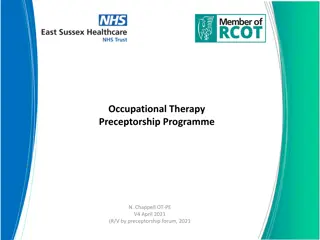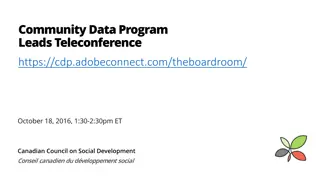Enhancing Preceptorship: A Comprehensive Guide for Leads
This resource, sponsored by Health Education England and NHS England, provides support for preceptorship leads in organizations to ensure quality guidance for preceptees. It covers standards, identification and development of preceptors, and regional reflections on preceptor roles. Key topics include preceptor preparation, CapitalAHP Standards, and activities to enhance preceptor attributes.
Download Presentation

Please find below an Image/Link to download the presentation.
The content on the website is provided AS IS for your information and personal use only. It may not be sold, licensed, or shared on other websites without obtaining consent from the author. Download presentation by click this link. If you encounter any issues during the download, it is possible that the publisher has removed the file from their server.
E N D
Presentation Transcript
Preceptorship: Learning Network Preceptor preparation This resource is designed to support preceptorship leads within organisations CapitalNurse is jointly sponsored by Health Education England, NHS England and NHS Improvement
Session outcomes: Through completing this session, you will explore how to prepare preceptors to ensure they provide quality guidance to preceptees. By the end of this session, you will: Understand standard six and seven of the CapitalAHP Standards Plan how you might identify preceptors within your organisation Explore ways to develop preceptors Plan how to evaluate the role of the preceptor.
CapitalAHP Standards: Each preceptee will be allocated a preceptor (Standard six) Preceptors will have min 12 months experience Demonstrate an understanding of preceptorship Skills required to undertake role Regualr formal meetings Clear escalation process Each preceptee/ preceptor will have protected rime for Preceptorship (Standard seven)
Regional reflections: Preceptors play a key role in providing structured support to preceptees giving them guidance and confidence in the development of their roles. Across the Capital, organisations have taken different approaches to preceptor roles, with variation in experience and banding levels. You can read about these on the next few slides. Newly registered staff have indicated that they want access to both practitioner expertise and also support and guidance from someone who has recent experience of being a preceptee. There is not currently an agreed definition of a preceptor.
Identifying and Developing Preceptors Mind-mapping session
Currently preceptors are the B5s clinical supervisors (B6/7) but all preceptees will be allocated a mentor Anybody qualified longer than 12 months- suggestion is to be different from clinical supervisor Preceptors are Band 6 and Band 7 staff Band 6 generally, as few Band 5s. Any staff who are willing and qualified longer than 12 months. Preceptors are clinical supervisors. This fits with our current supervision framework Any AHP who has been in the Trust for over 18 months.
Activities... Think about the role of the preceptor, what attributes do you think a preceptor should have to ensure they deliver quality guidance and support to a preceptee? List all the attributes you can think of. List what training a preceptor should have attained prior to becoming a preceptor. Next consider your current workforce, what training and development do you have available to support role development? Next, let s take a look at the training that is available to support the development of preceptors
Learning opportunities that support preceptor development: HEE elfh Hub (e-lfh.org.uk) Preceptor training Practice educator training Local supervision training Coaching and mentoring Motivational Interviewing Now let s look at the training that Capital Organisations currently provide:
virtual session, currently using the CapitalNurse slides. Although content is generic would be good to have some video/ examples that include AHPs. workshop for preceptees to attend. The final day of preceptorship programme looks at developing others starting preparation for the preceptor role. Preceptor training for both preceptor and preceptee. Regular support groups for both. Joint nursing / AHP Preceptor training day. Then touch point days set up with preceptorship lead to go through reflections and goals. We have clinical supervision training which is required for all supervisors at present.
Activities... Think about your organisation, who are / who will be your preceptors and why? How are / how will they selected? How do you develop your preceptors? Let s take a look at how organisations select their preceptors
Radiography volunteer. Therapy services are their supervisor. Operating Department Practitioner (OPD) are often Theatre Clinical Practice Educators (CPEs). Allocated by line manager in each team/department. same individuals per team. B6/7s. Moving forward likely to be the preceptees supervisor. mentor who the preceptees have chosen. Everyone will be expected to be a preceptor at some stage. We plan selected in line with clinical supervisors. Often band 6/7 of the same profession at present but still in the process of ironing this out. Band 6s. Generally, been qualified longer than 12 months, show enthusiasm and willing to support others. No set criteria to be preceptor apart from being experienced as an OT and being willing. Most preceptors and supervising the OT. Perhaps in line with clinical supervisor.
Activities... Think about your organisation, how will you / do you evaluate the role? For example, think about the impact of the role, preceptor experience, preceptee feedback, role development etc. What have you learned from your evaluation? Outline below, what you will do based on this learning? E.g. changes you will make. Let s take a look at how organisations have evaluated the role
We evaluate the preceptor workshop session but have not fully evaluated the role to date. It would be helpful to ask both the preceptor and preceptee to complete a specific evaluation at the end. Recent feedback questionnaire but not done previously. Most likely moving forward use of feedback questionnaires and possibly forums. Have used questionnaire, looking to expand these. Possibly focus groups. We have a preceptor network and have quarterly forums at which reflection/ feedback on the role is gathered. Focus groups, surveys for both preceptors and preceptees- have recently evaluated role and are in process of further developing preceptorship based on feedback received. Feedback questionnaire, meeting with preceptor and preceptee separately for feedback and how to improve/ develop.
Session review: Through completing this session, you will have explored how to prepare preceptors to ensure they provide quality guidance to preceptees and have had the opportunity to: Understand standard six and seven of the CapitalAHP Standards Plan how you might identify preceptors within your organisation Explore ways to develop preceptors Plan how to evaluate the role of the preceptor.



























